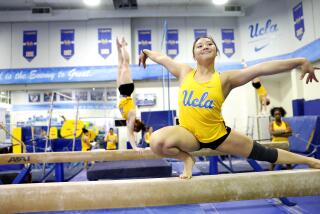Young athletes get star treatment as final preparations for Special Olympics get underway

Cities and communities across Southern California have volunteered as host towns for groups of athletes traveling to Los Angeles for the Special Olympics World Games. South Pasadena is hosting teams from Morocco and Paraguay.
Let the dreams begin.
For the lanky teenager from India whose freestyle stroke is swift.
For the 19-year-old Samoan sprinter who solemnly says: “I am brave enough to compete.”
For the two athletes from Kosovo who make up the smallest of the delegations.
They are here, 6,500 competitors and 2,000 coaches from 165 countries, for an event as grand as their aspirations: the Special Olympics World Games.
For most, it is their first time outside their country, their city, their village. Yet when they arrived this week to pick up their credentials they showed few signs of long travels — giddy at the police escort, the red carpet, the waiting cameras.
Los Angeles, they know, is a city of stars. And for a moment, they are counted among them.
Billed as the largest-ever gathering of nations in the city — the 1984 Summer Olympics hosted 140 — the Games will commence Saturday with an opening ceremony at the Los Angeles Memorial Coliseum. Stevie Wonder will sing. First Lady Michelle Obama will speak. There will be a nine-day flurry of events in 25 sports across the region.
But the gathering is not all competition and spectacle.
The delegations in the last few days enjoyed a smaller, more personal experience. Fanning out across Southern California, they were welcomed by the dozens of cities and communities that took them under their wing.
Athletes from Jamaica headed to Inglewood, ran through drills at the Forum with newly minted Los Angeles Clipper Paul Pierce and sampled tart treats from Yogurtland.
The Los Angeles Athletic Club took in members of the Colombia delegation, who rested on the downtown boutique hotel’s Italian linens after an evening cruise aboard a yacht.
Irvine shared line-dancing, barbecue and tethered helium balloon rides above Great Park with athletes from Korea. The Macau delegation, hosted by Whittier, danced to reggae music at a local park.
From San Luis Obispo south to San Diego County, there were parades, carnivals and dinners. Organizers who have spent months planning found themselves energized by the chance to cater to a population that often finds itself marginalized.
“This is a community that has put their arms around the Special Olympics,” said Misti Kerns of the Santa Monica Convention and Visitors Bureau, which spearheaded hosting delegations from Brazil and Romania. “We recognize that we are richer by the experiences other people can bring. Our hope is to make connections that will last.”
The host town program was launched two decades ago. By making the Special Olympics cause personal, the program generates much-needed support for the year-round competitions. The Southern California contingent, for example, hopes to increase its number of participants from 20,000 to 34,000 within the next couple of years.
The Games got their start in 1962 as a summer day camp in the backyard of Eunice Kennedy Shriver, whose older sister had an intellectual disability.
Shriver believed sports could unify communities — and she was intent on giving people like her sister the opportunity to explore their physical talents.
The first international Special Olympics were held in Chicago in 1968. The movement now serves more than 4 million people around the world, draws corporate sponsors and has cities vying to host it. Some predict the L.A. Games will bring 500,000 spectators and $400 million to the area.
To make it to the world stage, athletes must have medaled in a state or regional competition, commit to six weeks of training in their sport and be at least 8 years old. Special consideration is given to those who have never attended the Games before.
The United States has the largest delegation, with 344 competitors who convened at UC Riverside to train for a few days before joining the other competitors in the athlete villages at USC and UCLA.
The spirit of the World Games relies on a unique structure. It shies away from nationalism. Delegates do not carry flags. Patrons watch games for free. Medals are given to the top three finishers and ribbons are handed out to the rest. Inclusion is trumpeted, as are courage, unity, dignity, tolerance — and joy. It has always been about joy.
Picture Emanuelle Souza, an 18-year-old from Brazil enthralled by American pop culture. She has long yearned to see the Hollywood Walk of Fame, to visit the country that gave birth to Miley Cyrus and “The Hunger Games.” Diagnosed with an attention disorder — “I’m not so good at tests” — she found she did excel at learning English.
The chance to travel to Los Angeles had her in tears at her departure. “It was just so unreal to me. I was always dreaming to come here. I’m still not believing it,” she said.
This is the first time her home country has had a women’s soccer team at the World Games, and Souza will play defense. She feels pressure to represent. It is Brazil, after all. Soccer, she said, has helped her cope with shyness and introduced her to a circle of friends. “I’m feeling free doing the thing I love,” she said. “We can do the things that ‘normal’ people do.”
But for Souza, the Games feel less about triumph and more about an experience she cannot take in fast enough.
She and her teammates spent their first nights in Los Angeles at the Loyola Marymount University campus, eagerly trying to communicate with the young attendees of a cheerleading camp. At her first American buffet-style breakfast, she washed down her meal with a new discovery: cherry cola. “It’s so delicious.”
When she and her teammates arrived at Muscle Beach in Santa Monica on Wednesday morning for a scheduled yoga workout, she gaped at the nearby pier’s Ferris wheel and roller coaster. “Oh, I really want to go there,” she said.
Souza has grown up in a region known for its coastlines. But she was transfixed by Santa Monica’s sand, its ocean, its unfamiliar breeze. She stood for a few minutes, breathing it in. Her face beamed. The dream had begun.
For Special Olympics news, follow @corinaknoll.
NEWSLETTER: Get essential California headlines delivered daily >>
MORE:
FULL COVERAGE: Special Olympics
Special Olympics athletes arrive in host towns after long transportation delays
Special Olympics are expected to boost L.A.’s tourism industry
Special Olympics flame arrives in downtown L.A. for games
More to Read
Go beyond the scoreboard
Get the latest on L.A.'s teams in the daily Sports Report newsletter.
You may occasionally receive promotional content from the Los Angeles Times.







